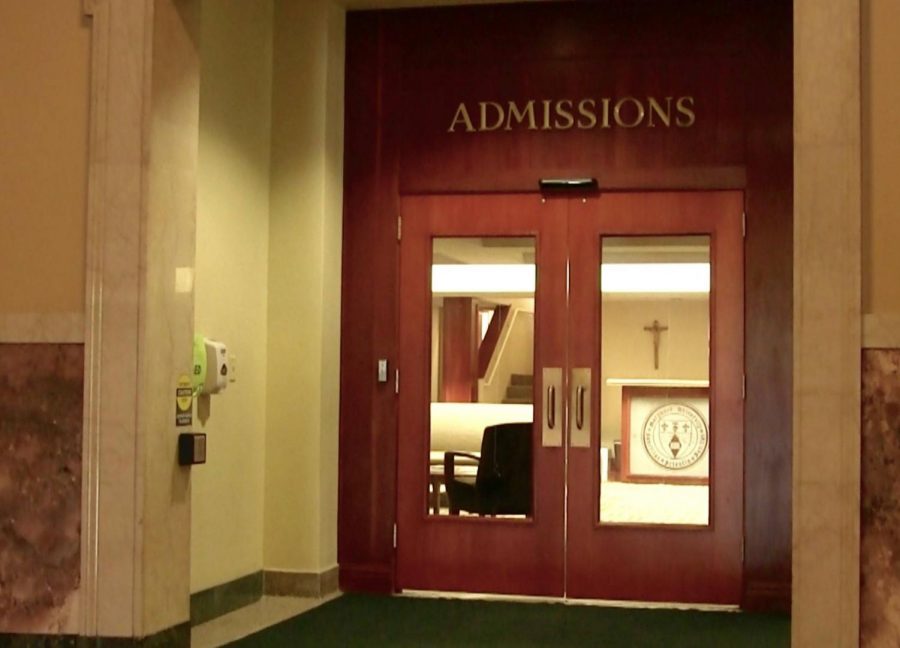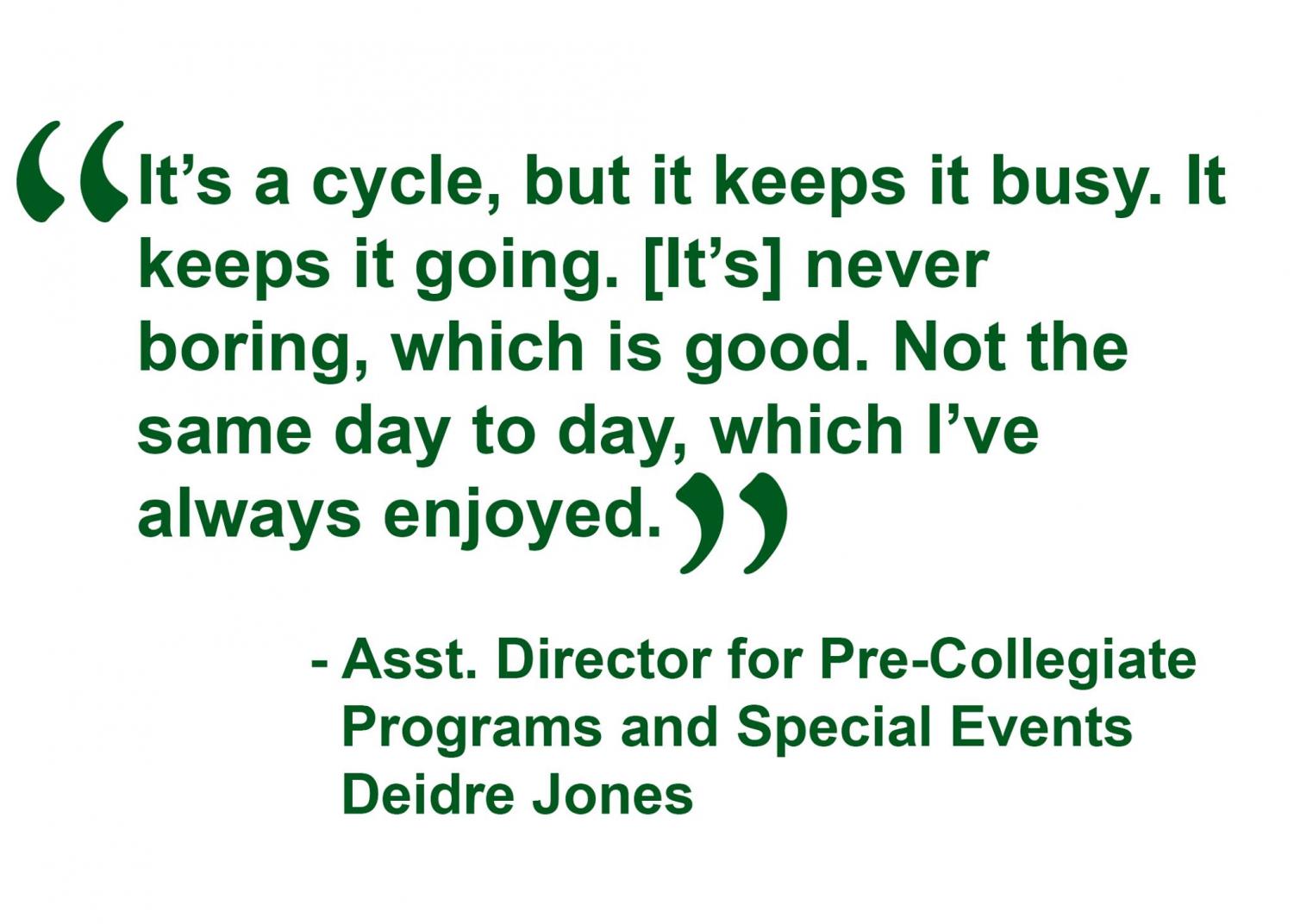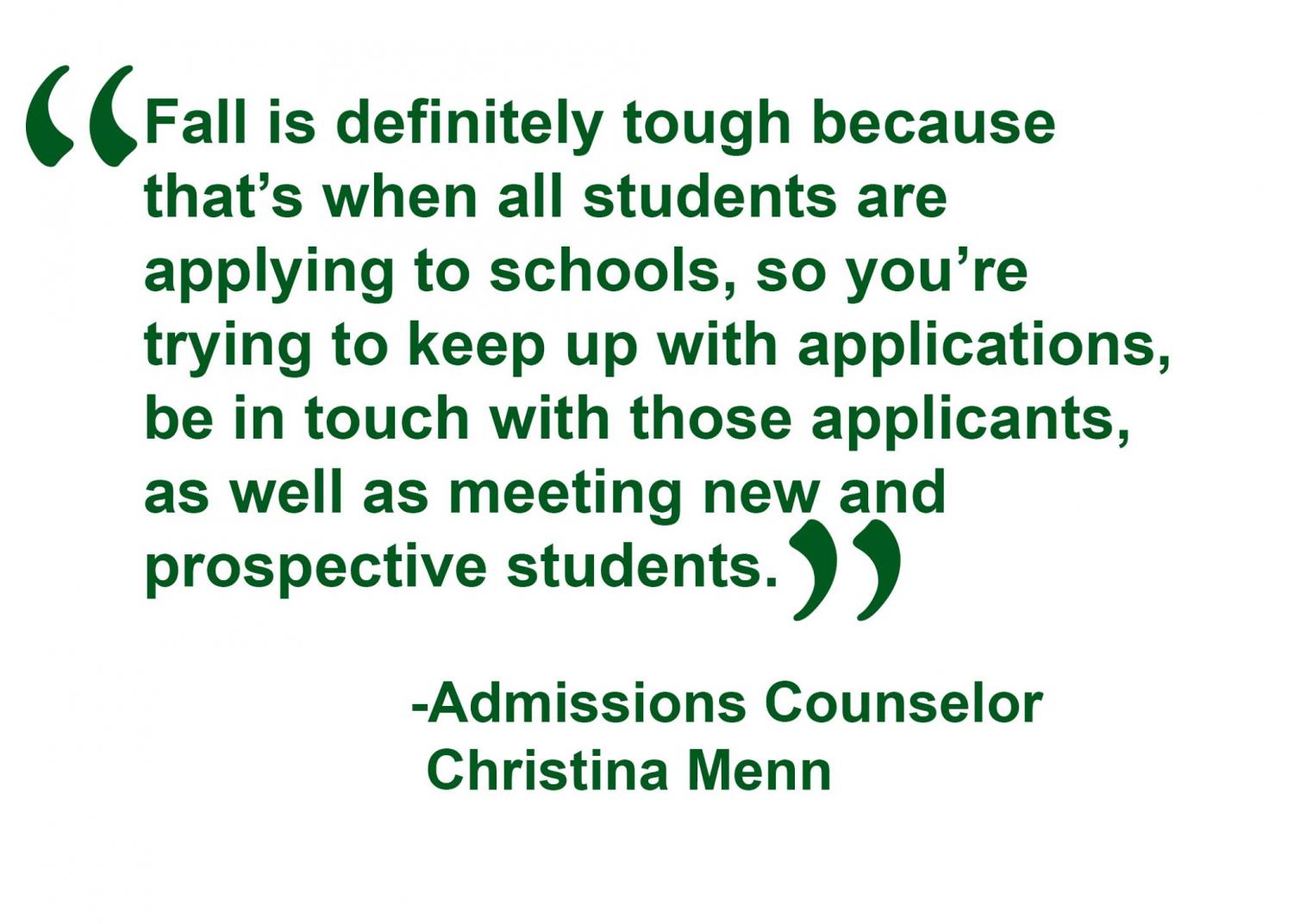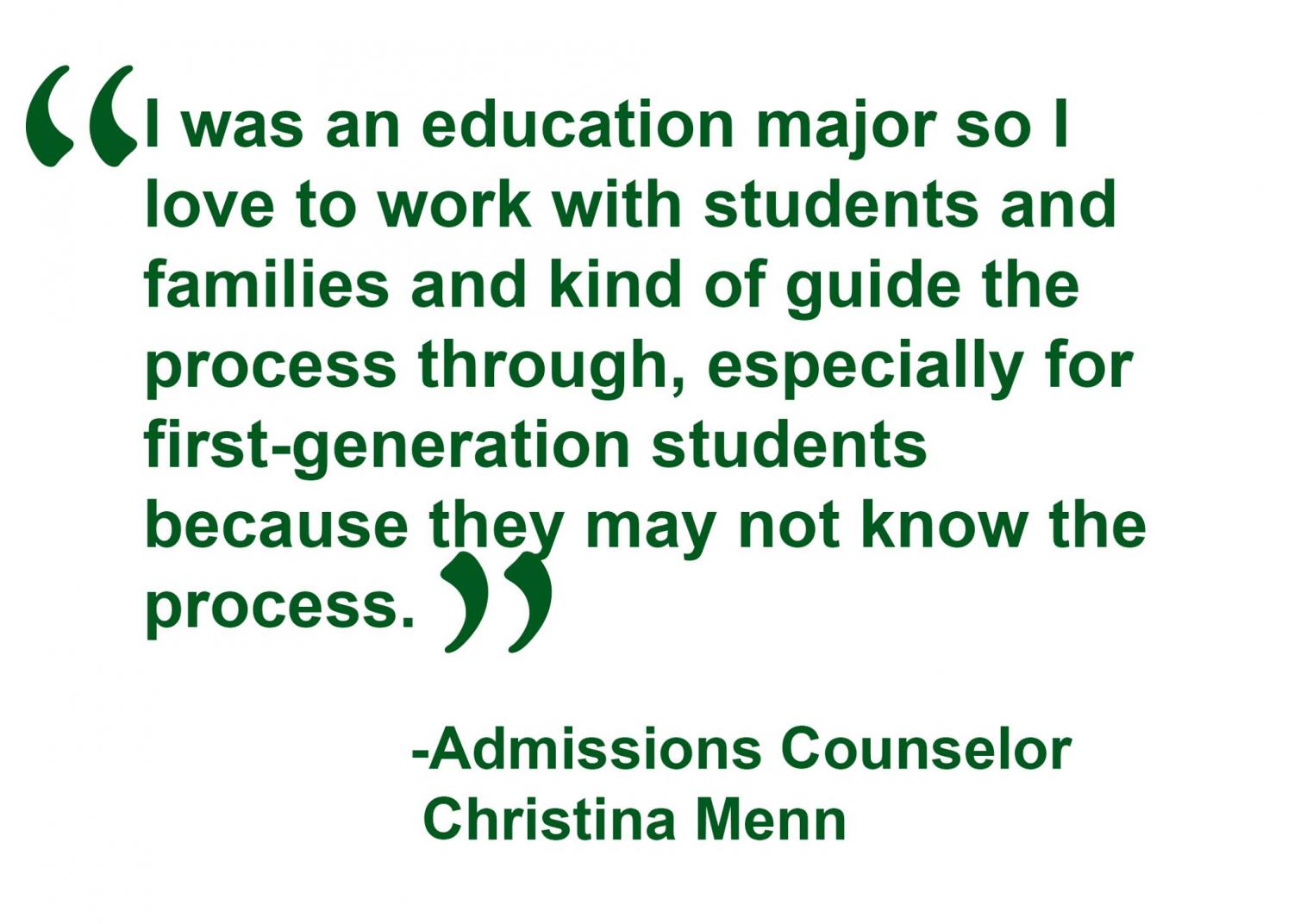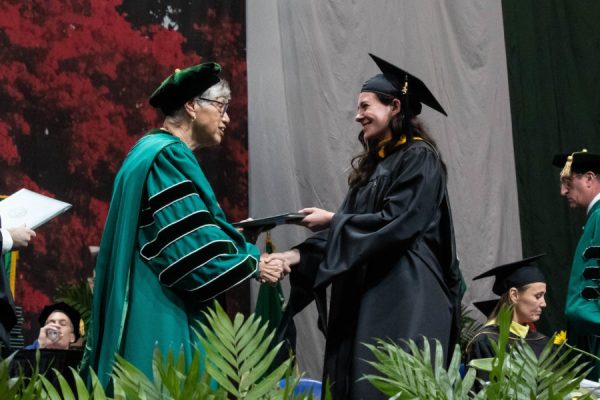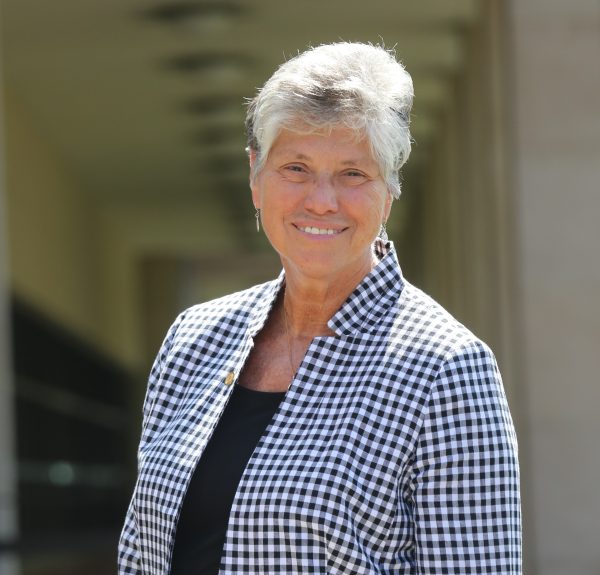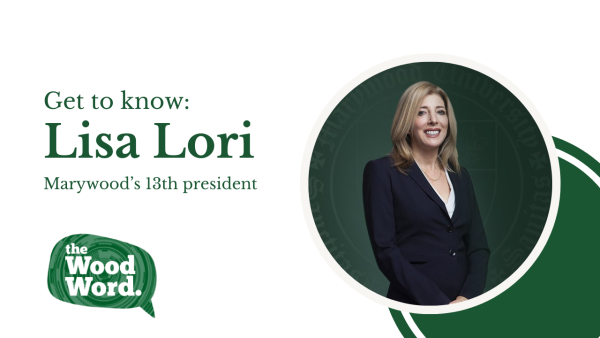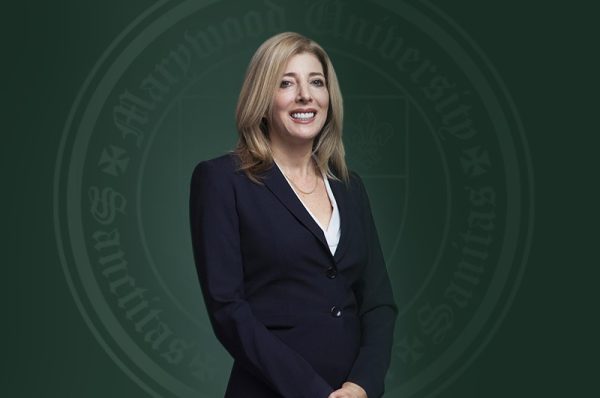Never-ending cycle for Marywood admissions department
December 31, 2017
“Three or 30 years,” said Senior Director of University Admissions Christian DiGregorio.
This is the amount of time he says admissions counselors typically remain in the field, either turning it into a lifelong career, or leaving when it becomes too difficult.
You would never know this was true when interacting with members from Marywood’s admissions department.
There’s no blending into the crowd for admissions team members at the first open house of the academic year. Each employee wears a different, brightly-colored polo shirt embellished with the Marywood logo.
Those who make up the polo-shirt rainbow, or the “box of crayons” nickname they give themselves, are admissions counselors. The shirt colors include green, blue, yellow, purple, orange, black and white, which match corresponding colored folders that are handed out to prospective students.
This connects high schoolers to a specific admissions counselor who represents the territory of their high school. It provides an easy visual for students to identify a person they can go to with questions.
“And what was the last name?” politely asks one beaming color of the rainbow to a high-school senior. The environment is hectic and loud as the Fireplace Lounge in Nazareth Student Center fills with prospective students, their parents and a whole lot of questions to be answered.
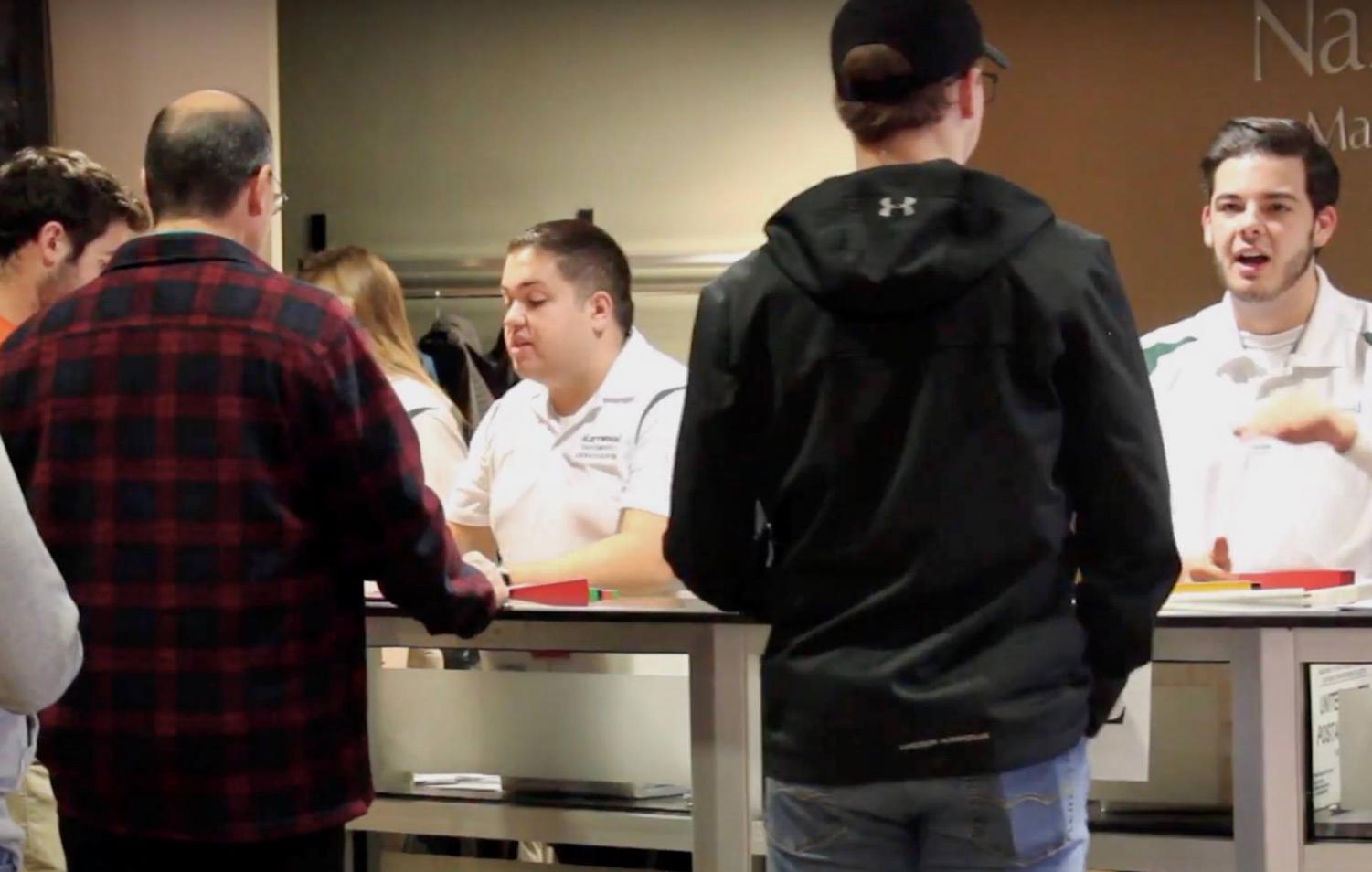
Students register at the first open house of the fall 2017 semester.
As students fill the room, the counselors begin to mingle. They smile, shake hands and do their best to win over both prospective students and their demanding parents.
The counselors’ camaraderie is real as they pose together for a group photo before the official presentation begins. These individuals can relate to one another. They know about the behind-the-scenes aspects of the admissions department. They know about the struggle of traveling to a new high school every week. They know how difficult it is to work all week long and then work 12-hour days on the weekends.
These tasks are all part of their job descriptions. Admissions counselors do more than just smile and shake hands. Their daily lives are filled with constant, never-ending motion as they each work to bring in the next graduating class of Marywood.
Admission counselors on the road
Deidre Jones works in Marywood’s admissions department as the assistant director for pre-collegiate programs and special events.
When it comes to working in admissions for three years or 30 years, Jones leans more toward the 30 years. She’s currently been in admissions for 17 years. She first worked as an admissions counselor at Marywood for five years and was promoted to the transfer coordinator position before becoming assistant director.
“It’s a cycle, but it keeps it busy. It keeps it going,” Jones said of her job. “[It’s] never boring, which is good. Not the same day to day, which I’ve always enjoyed.”
When it comes to the traveling cycles, Undergraduate Admissions Counselor Christina Menn said the typical travel season for admissions lasts from the beginning of September to mid-November, with sporadic trips after that time period. Additionally, travel resumes in the spring from March through the middle of May.
“Fall is pretty much all hands on deck as far as students who are applying,” said Menn.
This year, because of fewer admissions counselors working in the department, Jones found herself traveling more than she has in previous years. Her assigned territory: Long Island.
A typical trip includes more than just visiting high schools. Before the trip, Menn and Jones are contacting schools, speaking with secretaries and making schedules to attend as many high schools as possible in one trip. They also send marketing materials to the school before visiting and contact a database of students who are interested in Marywood to let them know they will be visiting their school.
Jones’ daily routine when traveling includes spending a chunk of the day driving to the location, arriving at the hotel, answering emails, doing office work remotely and then visiting multiple high schools the next day.
“You want to make the most of your time so you want to try to visit at least two to three schools in the same day,” she said.
Menn experienced her first fall travel season this year. Her assigned territories include Central and Western Pennsylvania, Maryland, Delaware and Luzerne County.
Menn said during travel season, “you’re pretty much working all the time because there’s always fairs or something on the weekends.”
She added that Marywood holds Saturday visits for prospective students and the admissions counselors have a rotating schedule for covering Saturdays.
Both Menn and Jones said they don’t mind the traveling. Jones said she likes to speak with high school students and guidance counselors in person. Menn said she likes to see different parts of the state and different cities.
“You get to know the area so you can know the type of student that works well or fits well at Marywood and would thrive here,” Menn said.
However, Menn said traveling can be tiresome, especially toward the end of a travel season.
“Some weeks are better than others, and it’s definitely something to get used to,” she said. “After so long, you just can’t wait to sleep in your bed. You can’t wait to be in your own house. You can’t wait to eat a home-cooked meal because you’re constantly eating out.”
Most admissions counselors, depending on the territories they cover, are traveling from Monday to Friday. Ideally, counselors plan their trip from Monday to Thursday so they can be back in the office on Friday and catch up on phone calls and emails, said Jones.
According to DiGregorio, most counselors work overtime because of the constant travel.
“Saturdays and Sundays you don’t get off,” he said. “You may be reading applications, you may be traveling. We have open house on Saturdays so you’re working straight through… and doing all this stuff and you’re traveling back and forth.”
Counselors handle the daily grind
When she’s not traveling, Jones is in charge of planning events such as open houses or college-for-a-day visits. The planning process includes contacting professors, contacting dining services, printing schedules, making packets, sending out confirmation letters, answering parent phone calls and handling registration.
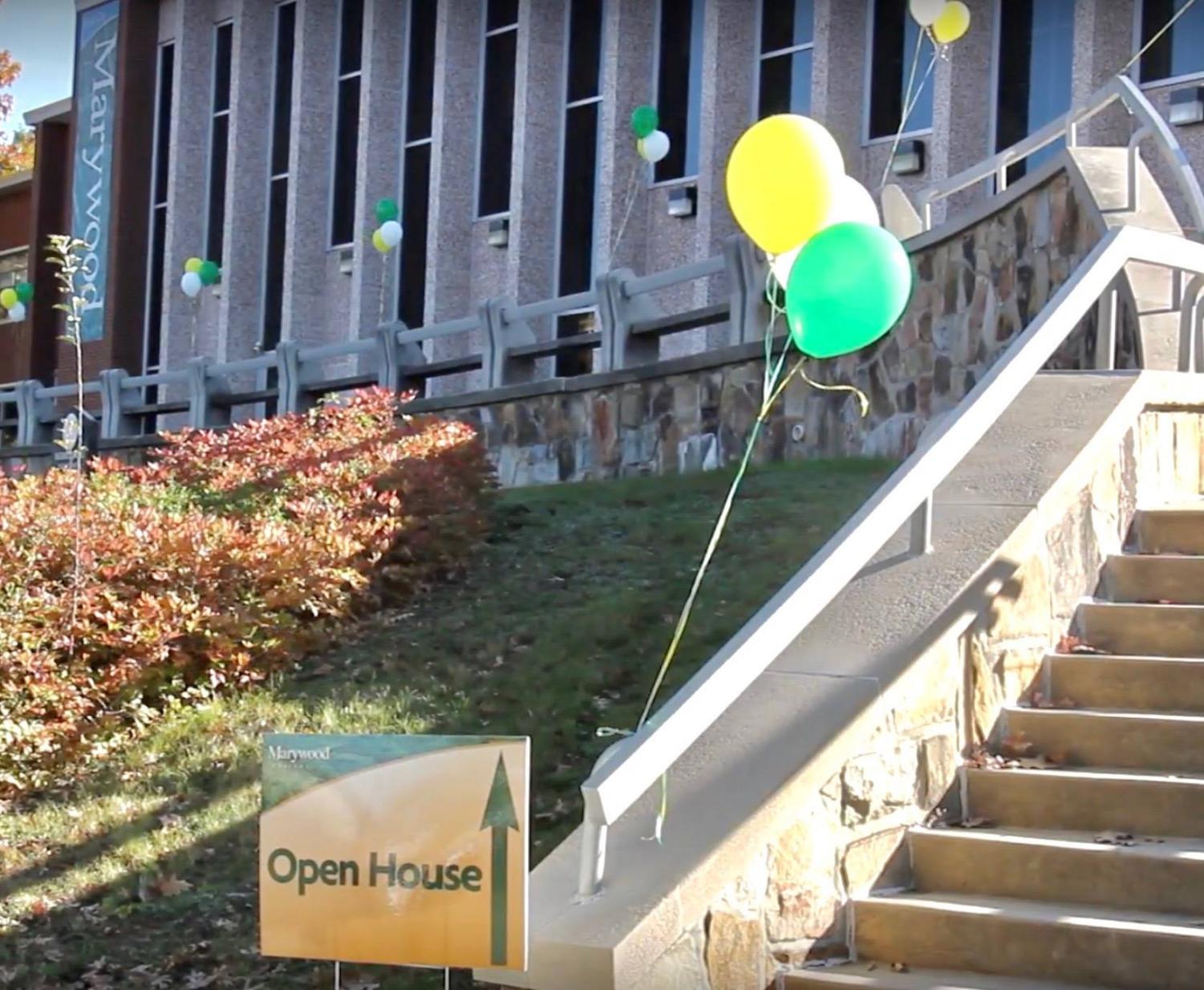
She also works closely with three local high schools in Lackawanna County. A typical day in the office includes answering phone calls and emails and reviewing applications.
Menn said she is constantly checking on current applications and guiding students through the application process to tell them what documents they are missing or answer any questions.
Even when it’s not peak college search season, there is still plenty to do in the admissions office. Students are constantly visiting, asking questions and wanting to meet with chairs of their interested academic department, which continues through the spring as applicants make final decisions. According to Jones, starting in the summer, high school juniors typically begin college visits and tours.
Additionally, the job requires current knowledge of every aspect of the university. A member on the admissions team reaches out to all Marywood academic departments twice per year to find out the latest updates. Admissions counselors meet with department chairs once a year to tour facilities and talk about programs to stay informed.
“It’s always good to have those little tidbits, especially when you’re on the road because you’re always going to get somebody who says, ‘tell me about your nutrition program,’ so it’s nice to have just one to two sentences that you can say about those programs,” Jones explained.
Menn added that admissions counselors are well versed in the popular programs at Marywood because they’re frequently answering questions about these majors.
Admissions counselors also focus on recruitment efforts for future years. DiGregorio explained how recruitment efforts for a Marywood class start two to four years before the class will step foot on campus as official Pacers.
He said the process usually starts with creating a prospect pool, which includes up to 100,000 names from a database of students who have shown interest in Marywood. This number gets narrowed down and ends with a final class size of around 550.
To collect this information, the admissions department uses projections from The College Board, which is an organization focused on higher education, as well as demographics to see the size of senior high school classes across the country. This data collection is another part of the daily tasks admissions counselors complete.
Once they narrow down the applicant list and have a final number of accepted students, counselors work to send out acceptance letters.
“Getting acceptances to students in a timely manner is very important because the quicker the turnaround response is, the more interested they will stay in Marywood,” Jones said.
When it’s not for everyone: the “three years” category
Jones described how many people serve as admissions counselors for only a few years because of the travel and lack of advancement.
According to an article from The Chronicle of Higher Education, the median salary for first-year admissions counselors is around $38,000, which does not include payment for overtime hours.
“If you’ve been in the position for a couple of years, obviously you’re looking to advance your career,” she said. “Once you’ve done the same thing for a couple of years and you see the same thing year after year after year, I don’t want to say that it gets boring, but you’re ready for something new.”
Menn, who has only been working for Marywood’s admissions department for 10 months, says she sees herself sticking with the job.
“I feel like there’s definitely a lot of opportunity, and it’s good to know what higher education is and to be involved with it is awesome,” Menn said.
She said she likes that the job is not monotonous because admissions is never the same.
“It’s literally like a cycle and it kind of just repeats itself,” Menn said. “It’s kind of nice to have a little bit of change.”
Jones explained how stresses such as dealing with overly-interested parents may deter admissions counselors from staying with the job. She described how helicopter parents are involved in the college search process and go as far as filling out their child’s application or opening their child’s acceptance package in front of admissions counselors.
“Sometimes the parents just take it a little too far,” she explained. “And parents have to be involved in the process because students rely on their parents’ opinion for a lot, but at the same time it’s a difficult balance.”
For Menn, her biggest stressor is also her favorite part of the job: Traveling.
Menn said it is hard to juggle everything during the travel season, and it’s stressful to stay on top of tasks because she is out of the office.
“Fall is definitely tough because that’s when all students are applying to schools, so you’re trying to keep up with applications, be in touch with those applicants, as well as meeting new and prospective students,” she said.
Menn cites her second biggest stressor as dealing with students who do not meet Marywood’s requirements or meet a certain program’s requirements, but want to enroll at Marywood.
“It’s just a matter of you don’t want to discourage them. You want to tell them that it’s still possible, you can definitely still go to school and give them more of the criticism that they need and the positive side of it,” Menn said.
Another difficulty and almost unobtainable demand is meeting certain admissions goals.
For the third year in a row, admissions directors across the country had “uneven success” filling their classes, according to Inside Higher Ed. Half of admissions directors are concerned about meeting recruitment goals set by their universities.
Navigating the current admissions environment
There are a few challenges facing the current admissions environment in higher education. DiGregorio said these challenges include the ever-changing college search process, demographics and a stigma that surrounds higher education.

According to DiGregorio, people currently view sending a student to college as a commodity. He said many individuals have become more aggressive and want to know what exactly they’ll get out of receiving a higher education.
DiGregorio said he is constantly bombarded with questions like: If I’m spending all this money and accumulating all this debt, should I even go to college? Do I even need a degree? If I buy this, what am I going to get out of it?
“It’s almost villainizing in some ways,” he said.
Regarding demographics, he explained how Marywood’s location in the northeast U.S. is getting hit the hardest when it comes to recruiting potential students. There are currently more graduating high school seniors in the south than in the northeast.
“[High school seniors] are just not there, but the pressure is on you to go get more,” said DiGregorio.
There are other outside factors that may affect Marywood’s recruitment efforts. Last June, New York state offered a free, public college tuition program called the Excelsior scholarship. According to New York state’s website, the program will allow 940,000 students to go to college for free if they meet certain requirements.
With New York neighboring Pennsylvania, DiGregorio said that Marywood had to create a plan for admissions counselors to justify the benefits of attending Marywood versus going to college for free.
The admissions department created a list of ways to sell Marywood to these students, focusing more on the graduation rate and the flexibility after graduation with not having to stay in the same state, which is a requirement of the Excelsior Scholarship.
Throughout her travels this summer, Jones said she noticed there were fewer students she spoke with in person. She said it’s difficult for high schoolers to leave class to speak with an admissions counselor because more students are taking AP classes or have difficult coursework. She also attributed this to how information is very “instantaneous” for high schoolers.
“They’re finding out so much more information online that for them to come down and speak one on one with somebody, I think they don’t realize the positive aspects of that,” Jones said. “We’re finding fewer and fewer people that we’re actually speaking with when we go out on the road.”
However, Jones said she feels the connections she is making with the students she does meet in person are more positive because of meeting with them individually.
“I can pinpoint and say, ‘you’re specifically interested in architecture, this is how our architecture program works,’ instead of just a lot of generalization about Marywood,” she said.
Menn said it can be hard to get in contact with students who haven’t reached out to the admissions department first with questions or to follow-up about an application.
“Sometimes it’s hard to get them really involved… [when] leaving a message, you may not hear back from that student,” said Menn.
According to DiGregorio, Marywood won’t see a large freshman class for the 2018-2019 academic year.
It’s “just the way the demographics are” based on The College Board projections and a lower number of high school senior students, he said.
Counselors find meaningful part of the job
Even with the difficulties and stresses, some admissions counselors think it is worth it to see prospective students enroll at Marywood.
Menn said it is nice to get to know prospective students and their parents and find out what their needs are when it comes to higher education.
“I was an education major so I love to work with students and families and kind of guide the process through, especially for first-generation students because they may not know the process,” Menn said.
For Jones, her hard work pays off when she sees admissions events that she has planned come together and be successful.
Her favorite admissions event of the year? Accepted Students Day in the spring.
“There’s just so much energy and the students are excited to be here and the parents are excited to be here and they’re just so thankful,” she said. “It’s just nice to see the whole cycle come together and hopefully see the students end up at Marywood.”
And then the never-ending cycle for the admissions staff begins again.
Contact the writer: [email protected]
Twitter: @RLookerTWW



